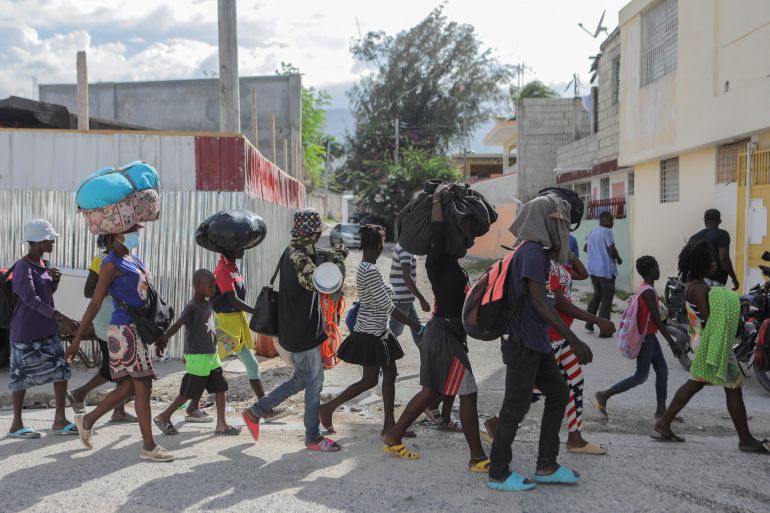US imposes new sanctions on Haiti officials for drug trafficking
Biden administration says measure aims to hold ‘corrupt officials accountable’ for activities destabilising Haiti.

The Biden administration has imposed new sanctions on Haitian officials accused of being involved in drug trafficking, as the United States and its allies continue to target corruption in the violence-plagued Caribbean nation.
The US Department of Treasury said on Friday that the sanctions targeted Haitian Senator Rony Celestin, as well as former Senator Richard Lenine Herve Fourcand.
Keep reading
list of 3 itemsChildren account for 40 percent of cholera cases in Haiti: UNICEF
Dominican deportations to Haiti fuel growing fears, frustration
“Rony Celestin and Richard Fourcand are two more examples of corrupt Haitian politicians abusing their power to further drug trafficking activities across the region,” Treasury official Brian E Nelson said in a statement.
“Treasury will continue to hold corrupt officials and malign actors accountable for the illicit drug trafficking that is destabilizing Haiti.”
Haiti has experienced months of surging violence as powerful gangs battled for control in the aftermath of President Jovenel Moise’s assassination in July 2021.
The country is also grappling with a deadly cholera outbreak and widespread hunger and malnutrition, while a weeks-long gang blockade on a major fuel terminal in the capital, Port-au-Prince, that has since been lifted led to electricity and water shortages.
Ulrika Richardson, the United Nations’s resident and humanitarian coordinator in Haiti, said last month that armed gangs controlled approximately 60 percent of the territory in Port-au-Prince, and were using sexual violence to “terrorise” residents.
Haiti’s acting Prime Minister Ariel Henry in October asked the international community to help set up a “specialised armed force” to restore security – a call backed by UN Secretary-General Antonio Guterres.
But the effort appears stalled, as the Biden administration so far has failed to get its allies to agree to lead such a mission, US media outlets have reported.
Haitian civil society groups also have raised staunch opposition to the prospect of a foreign force coming into the country, saying such interventions have historically brought more harm than good.
On Friday, the US Treasury accused Celestin, the current Haitian senator, of using his political position to “orchestrate” drug imports from Venezuela into Haiti, as well as drug exports to the US and the Bahamas.
It also alleged that Fourcand “uses his own aircraft to transport drugs through southern Haiti”, while seeking to install people in government positions “who would help to facilitate his drug trafficking activities”.
The sanctions will freeze the targeted individuals’ assets in the US and make it illegal for American citizens to do business with them.
Fourcand and a spokesperson for the Haitian prime minister’s office did not immediately respond to requests for comment from the Reuters news agency. Reuters also said it could not immediately reach Celestin for comment.
Today, I led colleagues from across the nation in a letter urging @POTUS to impose sanctions on known perpetrators and entities from the private and public sectors responsible for financing the insecurity in Haiti. #sosHaiti pic.twitter.com/ymkqlK0196
— Congresswoman Sheila Cherfilus-McCormick (@CongresswomanSC) October 8, 2022
In early October, a group of US Congress members urged the Biden administration to impose sanctions under the Global Magnitsky Act against “known perpetrators and entities from the private and public sectors responsible for financing the insecurity” in Haiti.
“These sanctions must target oligarchs, political elites, corrupt politicians, US citizens and US residents who finance extrajudicial killings, torture, and kidnappings of innocent Haitian nationals and, in some cases, American citizens,” the legislators wrote in a letter.
Last month, the US and Canada imposed coordinated sanctions against two other Haitian politicians for their alleged involvement in drug trafficking: Joseph Lambert and Youri Latortue, the current and former presidents of Haiti’s Senate, respectively.
Both Lambert and Latortue rejected the accusations.